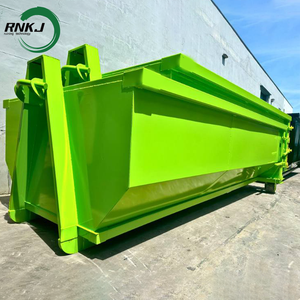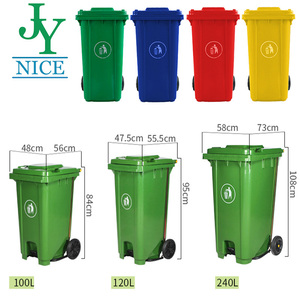(1250 products available)















































































































































































































Steel mobile waste container
These containers are made of steel and have wheels for easy movement. They are intended for trash collection and storage and can be found in industrial and commercial settings. They are often strong and long-lasting and come in various sizes to meet different waste management requirements.
Dumpsters
Steel mobile waste containers known as dumpsters are frequently seen outside businesses and homes. They are available in numerous sizes, such as 2, 4, 6, 8, and 10 yards, to handle various waste loads. They have a hinged door at the bottom for easy access for loading waste.
Front-end load (FEL) dumpsters
These containers are emptied by a front-loading garbage truck. They are low to the ground and have a smaller opening than the rear-end load dumpster. It is suitable for establishments with frequent waste generation, such as restaurants and hotels.
Rear-end load (REL) dumpsters
These containers have a large opening at the back, making them ideal for collecting heavy or bulky waste. They are often used in construction sites and factories.
Roll-off dumpsters
Roll-off containers are big steel waste bins typically used during construction or when cleaning up large areas. They are delivered and picked up by a special truck that rolls them on and off the back. They are easy to use because they can be kept for as long as needed and are perfect for disposing of a lot of stuff.
Compactors
Compactor containers are special bins that compress trash to make more room. They are great for places with limited space and lots of waste. They save money on garbage pickup costs because they reduce the number of trips needed.
recycling containers
Some mobile steel waste containers are meant for recycling. These containers help separate and collect recyclable materials like paper, plastics, metals, and glass. Some recycling bins may have different sections to sort different recyclables.
Food waste containers
Food waste containers are designed for collecting food waste in places like restaurants and supermarkets. They often have special features like tight lids to stop bad smells from coming out and wheels so they can be moved easily.
hazardous waste containers
These containers are designed for dangerous materials that can harm people or the environment. They are made to keep hazardous waste safe and have clear labels to show what type of hazardous waste they contain.
Steel mobile waste containers have a modular design with elements to ensure efficiency and durability.
Modular design
These containers have a modular design, meaning they come in different shapes and sizes. This design allows for easy customization to meet specific waste management needs. It also makes it easy to expand the system as the amount and type of waste generated change over time.
Aesthetic appeal
Steel mobile waste containers are designed to be visually pleasing. They often have smooth finishes and neat lines that make them look modern and clean. Some containers also have color coding and labeling to make them distinguishable and easy to use.
Accessibility
Steel mobile waste containers are designed with user accessibility. They have features like foot pedals for hands-free operation, and swivel casters make them easy to move. Some containers also have accessories like liners and liftable lids to make waste disposal more convenient.
Safety features
These containers have several safety features, like secure locking mechanisms to prevent accidental spillage and removable casters to keep the container stable when not in use. These safety features protect workers and the environment by ensuring that waste is contained and does not pose a risk to public health.
Collection of Construction Waste
Construction sites are messy. Mobile garbage bins are used to collect and dispose of construction debris. These containers can withstand heavy loads and rough handling. They help keep the site tidy and reduce the risk of accidents. Operators move the bins around the site to where work is ongoing. They place them conveniently so workers can easily dispose of waste.
Seasonal Yard Waste Collection
In landscaping and gardening, these containers collect seasonal yard waste. During fall, they collect leaves, branches, and clippings. During spring, they collect plants and debris. Steel containers resist the elements and make them suitable for outdoor use. They enable gardeners to efficiently manage organic waste.
Hospital Waste Management
Hospitals generate different types of waste. They include hazardous, infectious, and general waste. Mobile waste containers are used to separate and transport this waste within the hospital. Some containers are specially labeled to handle hazardous and infectious waste. They help prevent cross-contamination and protect staff and patients. They are also used to collect recycling and landfill waste in the central waste facility.
Event Waste Collection
For outdoor events and festivals, these containers collect trash and keep the area clean. The containers are placed conveniently so that attendees can easily find them. They are moved around to collect waste from different areas. They are durable and can withstand the rigors of event use. They help event organizers manage waste and enhance the attendee experience.
Industrial Waste Management
Mobile waste containers are used in factories to collect scrap materials and hazardous waste. They are moved to the area with the most waste. Some containers are designed for hazardous materials. They ensure safe transport to the disposal site. These containers help keep the factory floor clean and reduce the risk of accidents. They also improve productivity by reducing potential waste-related disruptions.
Mobile Waste Collection in Public Spaces
In public spaces like parks and streets, these containers are used to collect litter. Waste management services move them around. They are placed in areas with high traffic to ensure they are visible and accessible. These containers encourage the public to dispose of waste properly and help keep the environment clean.
Purpose and Type of Waste:
It is important to determine what the waste containers will be used for and to consider what type of waste will be disposed of. If the waste is hazardous, a special container that prevents leaks and spills may be needed. Containers used in construction sites where heavy debris is thrown away should be able to withstand rough handling. For businesses that generate a lot of organic waste like restaurants, containers that support composting can be helpful.
Capacity and Size:
It is important to choose a waste container with the right capacity and size to meet one's needs. Containers come in different sizes, so it is essential to evaluate how much waste will be generated regularly to select a suitable size. If the container is too small, it will quickly fill up, leading to overflow and potential littering. On the other hand, a container that is too big will take up unnecessary space and may be inconvenient to move around. Therefore, considering both the volume of waste produced and the space restrictions at the location is important for finding a properly sized container.
Durability and Material:
Since the container will be exposed to tough conditions both indoors and outdoors, it is important to select one made from long-lasting materials that can resist damage. Steel containers are often used because they can withstand rough treatment without getting crushed or having their wheels broken. This means one will not have to frequently replace the container due to wear and tear if it is durable.
Mobility and Maneuverability:
Another important factor to consider when choosing a waste container is how easily it can be moved from one place to another. It is crucial to ensure that the container has working wheels that can roll smoothly, even when it is filled with heavy waste. Also, check if the wheels can be locked so the container does not accidentally roll away while in use. Handles should be strong enough to grip and pull the container comfortably. This means the mobile waste container should be easy to move around, with secure wheels and handles.
Features and Accessories:
When selecting a mobile waste container, it is essential to consider any additional features or accessories that can enhance its use. Some containers have lids or covers that help contain odors and prevent pests from accessing the waste inside. Others may come with removable inner bins, making it easier to sort and empty different types of waste. Accessories like tags or labels can also aid in identifying what goes where. Therefore, looking out for these added features and extras can improve the convenience and efficiency of using the waste container.
Q1: Is the usage of waste containers limited to industrial sectors only?
A1: No, Waste containers are utilized in multiple sectors ranging from commercial to residential.
Q2: What variety of waste can be collected in mobile steel containers?
A2: Steel mobile waste containers can store solid waste, hazardous materials, and recyclables.
Q3: What are the merits of utilizing mobile waste containers?
A3: The benefits include durability, enhanced safety, ease of mobility, fire resistance, and recyclability.
Q4: How frequently should waste containers be emptied?
A4: The frequency of emptying the container relies on factors such as the volume of waste generated and the type of waste.
Q5: Do mobile waste containers incur rental charges?
A5: The cost of mobile steel waste containers varies depending on the supplier, container specifications, and whether they are rented or purchased.